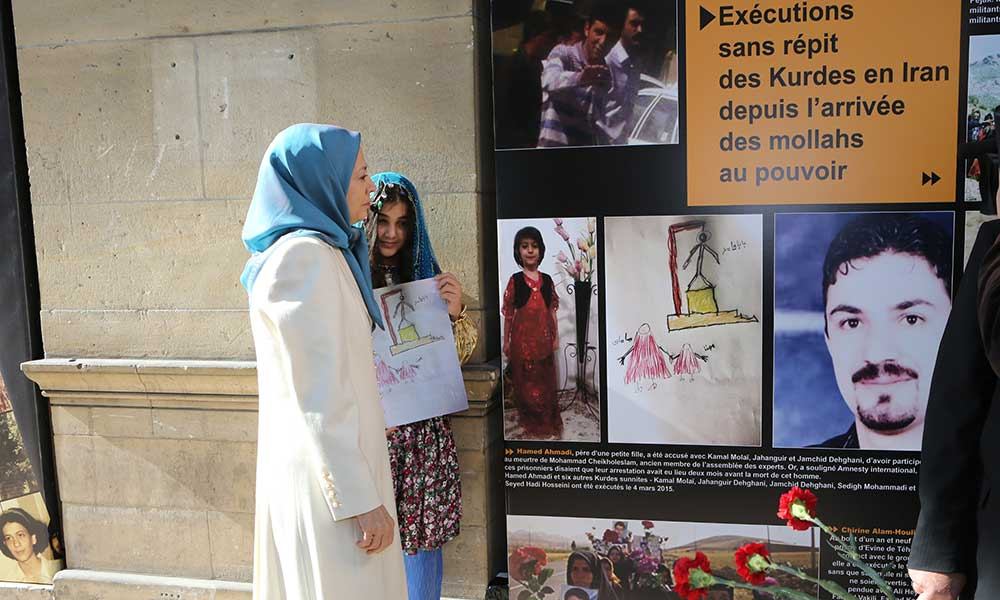Maryam Rajavi’s message on World Day Against the Death Penalty The nonstop cycle of executions is aimed at preserving the mullahs’ religious tyranny

It is also a day to reject the mullahs’ abhorrent regime who protect their decadent rule by daily executions in the face of public dissatisfaction and protests of a restless society that thirsts for freedom.
As Amnesty International has reported, with the exclusion of China, the Iranian regime accounts for 55 per cent of the total number of executions in the world. Therefore, the World Day against the Death Penalty is a day when the world says no to the mullahs’ religious tyranny.
What distinguishes the executions in Iran from those carried out in other parts of the world, are not the number of executions but their systematic trend. One of the pillars of the clerical regime’s rule are executions in which all of the regime’s factions collaborate. Under whatever pretext or charge, the mullahs’ intention in carrying out the executions is to preserve and escalate repression and general terror. In fact, the government’s killing machine is at work day and night. They increase and decrease the number of hangings upon Khamenei’s order and depending on domestic and international political situation. They take advantage of these killings to balance the defeats and disabilities of the ruling power, or counter the spirit of protests in society.
For this reason, international bodies have time and again confirmed that the orders for many of these hangings have been issued first for crimes that were either vague or were not considered “very serious crimes” from the standpoint of “international standards.”
Secondly, the victims of executions are deprived of their rights to a fair trial and due process of law. Before anything else, they are victims of organized crimes whose continuation is the regime’s daily need.
As the UN rapporteur on human rights in Iran has stated, “Many of those executed are poor and belong to marginalized groups in Iranian society.”
As in the anti-patriotic war with Iraq where Khomeini used young men and teenagers as cannon fodder and disposable soldiers, the ruling mullahs are now imposing an agonizing poverty on the Iranian people driving many towards depravity and corruption. In the meantime, they hang the victims of those wrongdoings and crimes in the nonstop cycle of hangings and executions. With utmost cruelty, they do not even spare the mentally disabled and those who committed crime as a minor. In addition, an endless line of thousands of unfortunate prisoners is on the death row.
This is while the children of the regime’s officials who commit much worse crimes including astronomical embezzlements and theft are immune from any form of punishment. More importantly, the Islamic Revolutionary Guard Corps and the ruling mullahs hold the strings that control many of the crimes for which the poor are executed, including drug trafficking and prostitution.
Fortunately, the opposition to the mullahs’ criminal regime is growing every day among the populace and the families of prisoners and execution victims have repeatedly staged protests outside the regime’s prisons and other centers in protest to the execution of their children and relatives.
The Iranian Resistance espouses the abolition of the death penalty in Iran after the overthrow of the clerical regime and rejects the inhuman punishment of retribution as it is diametrically opposed to the spirit of clemency and compassion of the Mohammadan Islam.
Once again, I call on Western governments to make their commercial and diplomatic relations with the religious dictatorship ruling Iran, contingent on the end to torture and executions.
I urge the United Nations to set up a committee to investigate the 1988 massacre in Iran and hold accountable its masterminds and perpetrators who remain in charge of executions carried out today in Iran.
The prosecution of the masterminds and perpetrators of the 1988 massacre has turned into a general desire in the Iranian society, more than ever before. The Call for Justice Campaign is an indispensable part of the efforts to end the wave of executions in Iran.
I call on my fellow compatriots, particularly the Iranian youths, to stand up to the policy of execution and slaughter. The campaign against the death penalty is part and parcel with the campaign seeking to overthrow the clerical regime and rid the people of Iran from the mullahs’ atrocious rule.

